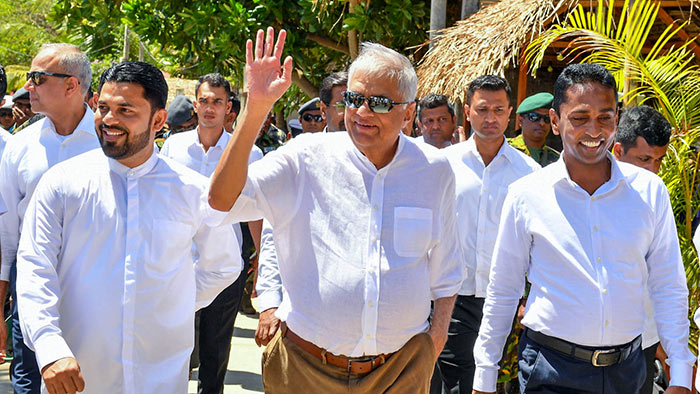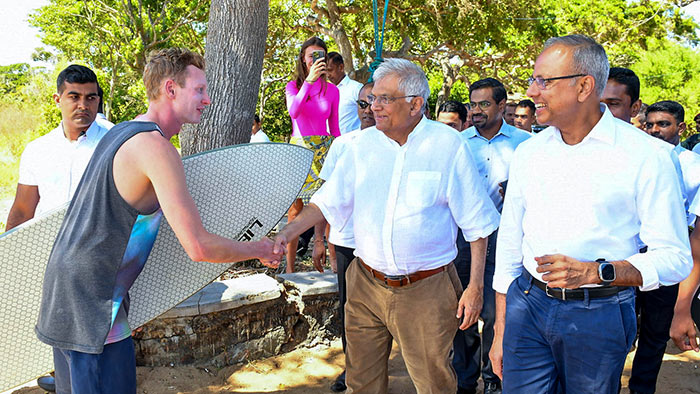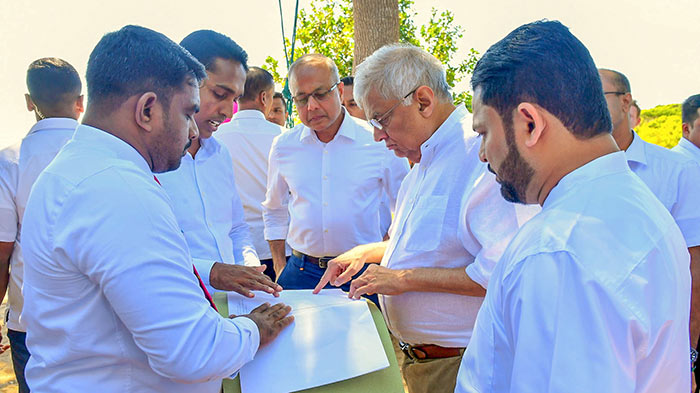Sri Lanka President reveals strategic roadmap to transform ‘Arugam Bay’ into a high-income tourist destination

Sri Lanka President Ranil Wickremesinghe has announced the swift implementation of a comprehensive plan to elevate the Arugam Bay tourist zone into a highly desirable destination for both local and international tourists, with the potential to generate substantial revenue.
The President emphasized the importance of meticulous planning in identifying areas that necessitate development, with the intention of executing these initiatives systematically.
The President further highlighted the prospect of achieving significant income by promoting water sports such as water skiing, which holds popularity along the Arugam Bay coastline.
President Ranil Wickremesinghe conveyed these remarks during a meeting held today (August 25) with key stakeholders in the tourism industry within the Ampara district.
The gathering brought together government officials and industry professionals, aimed at addressing pertinent challenges that have emerged within the tourism sector.
The President underscored that global reports predict tourism to contribute 10% of the global gross domestic product by the year 2035.
He stressed that Sri Lanka should proactively prepare for this shift and highlighted the tourism sector’s potential to directly address the nation’s financial challenges.
President Ranil Wickremesinghe also outlined a two-phase development plan for the tourism industry in the Eastern Province, with the ambitious goal of completing it within the next decade.
Furthermore, during his ongoing tour of the Eastern Province, President Ranil Wickremesinghe conducted an inspection of Arugam Bay and Peanut Farm beaches in the Ampara district this morning (August 25).
The President personally assessed the areas’ shortcomings and engaged in cordial conversations with the tourists present there.
Following the site visit, President Wickremesinghe engaged in discussions with the local business community to gain insights into the challenges faced within the tourism sector in the area.
This comprehensive engagement reflects the President’s commitment to actively addressing the needs and potential of the Eastern Province’s tourism industry.
In the process of developing the Arugam Bay Coastline into a prominent tourist destination, a proposal was put forth to relocate the existing fishing port to an alternative location, equipped with necessary facilities for fishermen.

This proposal was conveyed to the President by Member of Parliament Mr. W.D. Weerasinghe.
In response, the President emphasized the urgency of transforming this region into a dedicated tourism area while taking swift action on the proposal.
Furthermore, the President’s attention was drawn to the challenges arising from the absence of permanent property deeds for business premises within the local tourism industry.
President Ranil Wickremesinghe stressed the importance of promptly submitting a comprehensive report detailing these issues, with an expectation for viable solutions to be presented.
Another key concern addressed was the availability of drinking water for both business establishments and visiting tourists in the area.
Recognizing that the construction of the proposed ‘Hada Oya’ drinking water project might take several more years, President Wickremesinghe directed officials to explore the installation of establishing water treatment plants at existing natural water sources, with assistance from the Navy to address these multifaceted challenges in the pursuit of transforming Arugam Bay as a premier tourist destination while ensuring the well-being of the local community and visiting tourists.

President Ranil Wickremesinghe emphasized the following points:
“Reflecting on the previous year, our nation faced an economic collapse that led us into a state of indebtedness.
Thanks to well-executed government initiatives, we managed to avert bankruptcy this year, but the responsibility of repaying these debts remains.
Additionally, foreign exchange is pivotal for propelling the country’s progress.
Hence, maintaining a favourable trade balance is imperative; otherwise, we risk encountering another economic crisis in a decade due to escalating debt.
To counter this potential scenario, we have devised a novel program.
Notably, substantial focus has been directed towards the Eastern Province, with a particular emphasis on the Trincomalee district’s development.
In this endeavour, we have secured support from India for advancing the Trincomalee district.
Our plan encompasses harnessing the land portion of the left bank of the Mahaweli zone to facilitate development activities.
This includes the establishment of a sizable investment zone spanning approximately a thousand acres.
It’s crucial to highlight that, concurrent with the tourism industry’s advancement, an agricultural modernization scheme and a development project for the fishing industry are being formulated to elevate these industries’ prospects.
Moreover, a primary objective is to enhance the living standards of the Ampara district’s people, a region inhabited by economically disadvantaged individuals.
This has been a key focus, driving the modernization of both the fishing and agricultural sectors in Ampara.
The target of achieving a rice yield of at least 7 to 8 metric tons per hectare is set, with corresponding initiatives in animal husbandry being enacted in the province as well.
In the forthcoming decade, a concerted effort is being directed towards elevating the annual tourist influx from 2.5 million to 5 million initially, followed by a subsequent surge to 10 million visitors.
Global projections underscore that by 2035, a significant 10% of the global GDP will be attributed to the tourism sector.
Hence, nations must take heed of their contribution to this economic trend.
In line with this, a robust initiative seeks to attract no less than 10-20 million tourists annually to this region.
The formulation of a comprehensive strategy to levy fees of $300 or $500 per day per tourist is in progress, aimed at materializing this goal within the Eastern Province.
Presently, the landscape of tourism exhibits distinctive features. A segment of tourists gravitates towards these provinces.
Nurturing activities such as water skiing, which holds substantial tourist allure, becomes pivotal.
The complete transformation of this entire region into a dedicated tourist hub is a primary objective. Concurrently, the urban and rural development endeavours must continue to advance.
It is imperative to distinguish between the advancement of tourism and the enhancement of people’s livelihoods.
A pivotal focus is directed towards the enhancement of the Ampara bus stand. Strategic arrangements must be crafted to facilitate tourists’ multi-day visits to the Ampara district.
Furthermore, a holistic approach should be adopted to render the entire country an enticing destination for tourists.
Diligent endeavours are underway to bolster revenue from the burgeoning tourism sector.”
Member of Parliament Mr. W.D. Weerasinghe,
Discussing the issue of the fishing pier located at the entrance to Arugam Bay beach, an enduring historical concern has been raised. It’s noteworthy that as far back as 1987, the late President Mr. J.R. Jayawardena also deliberated on the potential removal of this structure.
However, despite these considerations, the effort to address this matter, unfortunately, did not materialize.
Additionally, swift resolutions are sought for the challenges faced by individuals engaged in the tourism sector.
In this context, the Honourable President Wickremesinghe convened a comprehensive discussion today involving officials from various institutions, including the Ministry of Environment, Department of Coastal Conservation, Department of Forest Conservation, and Department of Wildlife. We hold confidence in the President’s expert understanding of these complexities, and we anticipate the provision of appropriate solutions to these issues.
Member of Parliament Mr. S.M.M Musharraf,
In the current discussion, I wish to emphasize that a comprehensive breakdown of President Wickremesinghe’s developmental vision for the area is superfluous.
His profound understanding of these intricacies has become apparent, particularly following his first-hand exploration of Arugam Bay and Peanut Farm earlier today.
As the President continues to lead the nation’s development agenda, it becomes evident that his stewardship might need to extend over a prolonged period, possibly spanning 10 to 15 years.
We steadfastly believe that successful development frequently hinges on the willingness to make difficult choices. The President is now actively implementing these crucial strategies and plans.
Member of Parliament Mr A.L.M. Ataullah,
Our nation is graced with a wealth of historical heritage and natural magnificence that transcends provincial boundaries.
Every region contributes its unique intrinsic value, endowed with distinct resources. Hence, the Eastern Province possesses the potential to significantly bolster the country’s economic foundation.
It is essential to acknowledge the profound value of our nation. By crafting solutions for its challenges and crafting policy decisions, we can navigate the path toward exceptional progress.
We repose our trust in the President’s seasoned political intelligence to lead this charge.
Preserving antiquities as a shared heritage, encompassing all individuals born within this nation, is paramount. Equally, safeguarding the forest ecosystem necessitates a meticulous, well-devised strategy.
The event was attended by Senior Advisor to the President on National Security and Chief of Presidential Staff, Sagala Ratnayaka Eastern Province Governor Senthil Thondaman, and other officials.
(Courtesy: President’s Media)

Latest Headlines in Sri Lanka
- Indian PM Narendra Modi to visit Sri Lanka in early April 2025 March 15, 2025
- Sri Lankan President joins special Iftar ceremony at Temple Trees March 15, 2025
- Customs Inspector arrested for smuggling Rs. 30 Million cannabis oil March 15, 2025
- Police constable arrested for taking bribe to issue clearance certificate March 15, 2025
- COPE uncovers irregular NMRA certification process March 14, 2025


